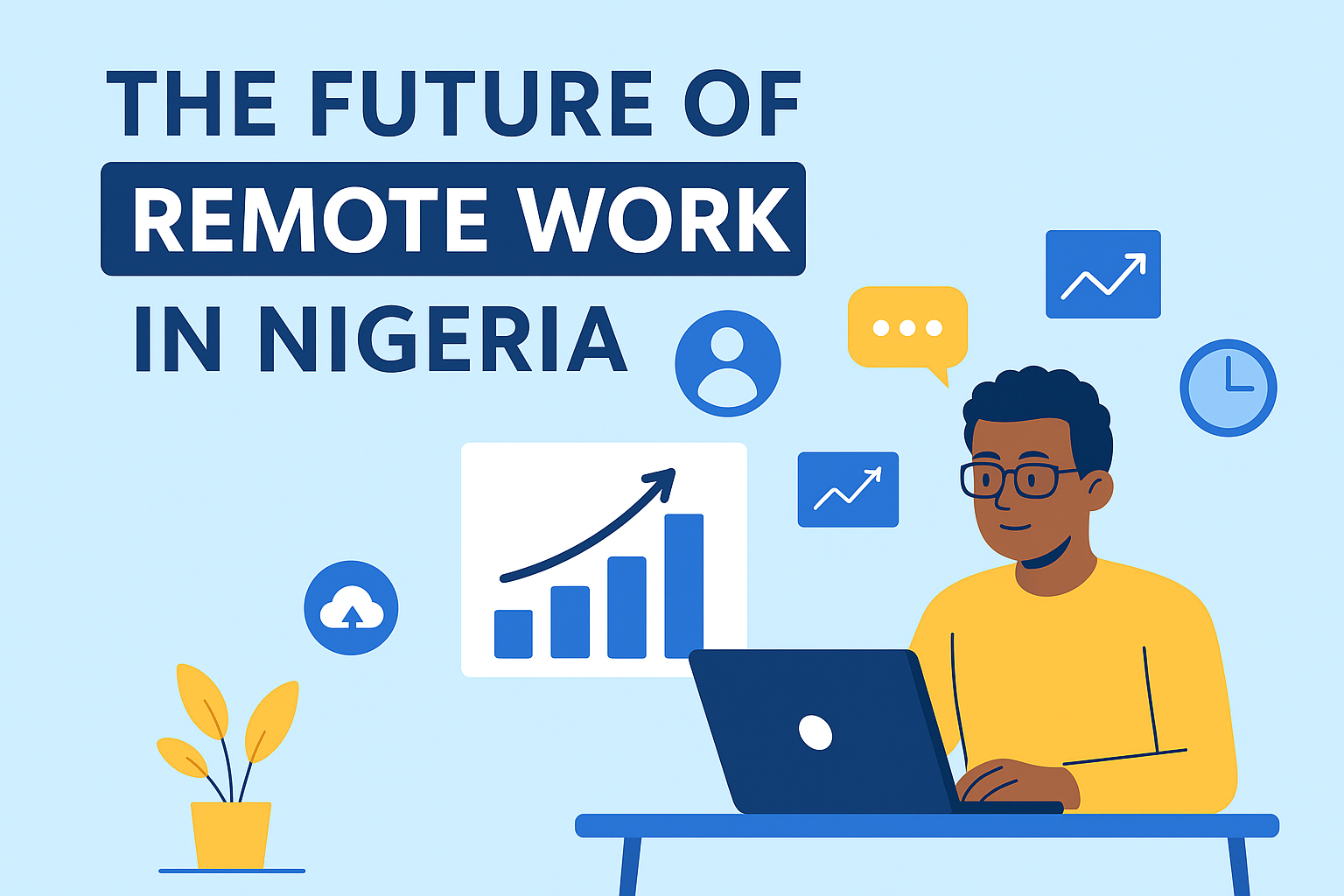The Future of Remote Work in Nigeria (2025 Guide): Best Tools, Platforms, and Opportunities
Introduction to Remote Work in Nigeria
Remote work in Nigeria has grown rapidly in recent years, shaped by technology, socio-economic changes, and the global pandemic. What was once limited to tech startups is now being adopted across banking, education, media, and consulting sectors.
Before the COVID-19 pandemic, remote work adoption was slow, but the lockdowns forced businesses to embrace flexible work policies. Today, companies are realising their long-term benefits—lower costs, better productivity, and wider access to talent across Nigeria’s 36 states.
For workers, remote jobs reduce commuting stress, improve work-life balance, and create access to global opportunities. However, challenges like poor internet connectivity, inconsistent power supply, and the need for self-discipline remain hurdles.
Despite these issues, the future of remote work in Nigeria is promising. Businesses, workers, and even government bodies are investing in the infrastructure, tools, and skills required to make remote work sustainable.
Read also: Top Digital Skills You Should Learn in 2025
Why Remote Work Matters in Nigeria
- Cost Savings for Companies: Reduced office rent and utilities.
- Access to Wider Talent Pool: Employers can hire top talent from Kano, Enugu, or Jos without relocation.
- Work-Life Balance for Employees: Less time wasted in Lagos traffic means more focus on productivity.
- Global Opportunities: Nigerians can compete for jobs on international freelance platforms.
Remote work is not just a trend—it’s shaping the future of employment in Nigeria.
Key Tools for Remote Work Success
Choosing the right tools makes the difference between thriving and struggling in remote work. Below are essential categories and recommended tools widely used in Nigeria.
1. Communication Tools
- Zoom – Video conferencing, webinars, and virtual meetings.
- Google Meet – Affordable, reliable option for team calls.
- Slack – Messaging and team collaboration with dedicated channels.
- WhatsApp Business – Popular in Nigeria for quick client and team updates.
2. Project Management Tools
- Trello – Visual boards for task tracking.
- Asana – Team task management with timelines.
- Monday.com – Great for businesses with multiple workflows.
3. Time Management Tools
- Clockify – Tracks working hours for individuals and teams.
- Toggl – Simple time-tracking with productivity reports.
- RescueTime – Identifies time-wasting habits and improves focus.
4. Collaboration Tools
- Google Workspace (Docs, Sheets, Drive) – Affordable, cloud-based collaboration.
- Microsoft 365 – Advanced business collaboration and email hosting.
- Notion – Combines notes, tasks, and project management.
Most of these tools offer free plans, making them accessible to Nigerian startups and freelancers.
Read also: Transforming Nigerian Businesses with Digital Tools In 2025
Top Platforms for Remote Job Opportunities
Remote work platforms help Nigerians find freelance and full-time jobs worldwide. Here are the best platforms to explore:
1. Upwork
- One of the largest freelancing sites.
- Popular for writing, web development, design, and marketing.
- Success Tip: Optimise your profile with skills like “content writing Nigeria,” “remote software developer,” etc.
2. Fiverr
- Allows freelancers to create “gigs” starting from $5.
- Great for creatives (designers, writers, voice-over artists).
- Success Tip: Use attractive thumbnails and SEO-friendly gig titles.
3. Remote.co
- Focuses only on remote jobs.
- Offers roles in customer service, programming, and management.
- Success Tip: Tailor applications to job requirements, highlighting remote readiness.
4. Freelancer.com
- Offers project-based bidding.
- Useful for both short and long-term jobs.
5. Local Nigerian Platforms
- Jobberman – Lists local, remote, and hybrid jobs.
- Hot Nigerian Jobs – Features opportunities in tech, finance, and NGOs.
By mastering these platforms, Nigerians can connect with both local and global employers.
Read also: 5G in Nigeria 2025: What to Expect in the Next Few Years
Challenges of Remote Work in Nigeria
While remote work is exciting, there are practical challenges:
- Internet Connectivity: Not all regions have strong, stable broadband.
- Power Supply: Frequent outages increase reliance on generators or inverters.
- Digital Skills Gap: Not everyone is trained for remote tools and platforms.
- Discipline and Work Culture: Working from home requires strong time management.
The Future Landscape of Remote Work in Nigeria
1. Hybrid Work Models
More companies will adopt hybrid systems, allowing employees to split time between the office and home.
2. Digital Skills Training
Expect more training centres offering certifications in digital marketing, coding, data analysis, and cloud tools.
3. Government Policies
The Nigerian government is gradually recognising remote work’s potential. Incentives for tech hubs and internet expansion projects (like fibre optics) will play a key role.
4. Global Positioning
Nigeria could become a remote work hub in Africa, attracting international companies to hire its skilled workforce.
5. Economic Growth
Remote jobs will reduce unemployment, empower youths, and attract foreign income through freelancing.
Conclusion
Remote work in Nigeria is not just a temporary trend—it’s a sustainable model reshaping the future of employment. With the right tools, skills, and government support, Nigerians can thrive in the global digital economy.
By embracing remote job platforms, mastering collaboration tools, and upgrading digital skills, Nigerian workers and businesses will position themselves for success in 2025 and beyond.
Looking to build a remote-ready website, digital platform, or IT solution for your business in Nigeria?
At ENGRMKS & CO., we specialise in Web Design, Development, and IT Support that empowers businesses to thrive in the digital age.
???? Contact us today at engrmks@gmail.com or visit engrmks.com.ng to transform your online presence.



